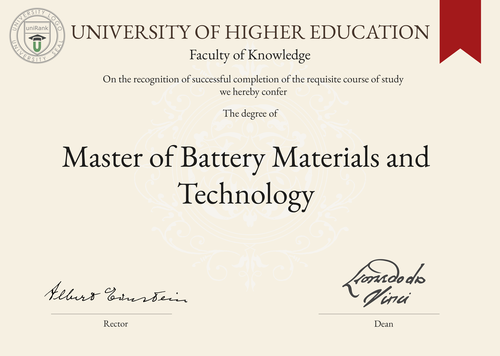
Master of Battery Materials and Technology (M.B.M.T.)
Guide to Master of Battery Materials and Technology Program/Course/Degree
Master of Battery Materials and Technology (M.B.M.T.)

Program Name:
Master of Battery Materials and TechnologyProgram or Degree abbreviation:
M.B.M.T.Duration range:
Varies by country and university, typically 1-2 yearsTuition range:
Varies by country and university, typically $10,000-$30,000 per yearOverview:
The Master of Battery Materials and Technology program is designed to provide students with a comprehensive understanding of battery materials, their properties and their applications in various industries. This program combines theoretical knowledge with practical skills to prepare graduates for careers in the rapidly growing field of battery technology.Curriculum Overview by year:
- Year 1: Introduction to Battery Materials, Electrochemistry, Battery Design and Manufacturing, Energy Storage Systems - Year 2: Advanced Battery Materials, Battery Testing and Characterization, Battery Management Systems, Research ProjectKey Components:
- Understanding battery materials and their properties - Designing and manufacturing batteries - Testing and characterizing battery performance - Developing battery management systems - Conducting research in battery technologyCareer Prospects:
Graduates of the Master of Battery Materials and Technology program can pursue various career paths in industries such as renewable energy, electric vehicles, consumer electronics and energy storage. Potential job roles include battery engineer, research scientist, product development manager and energy storage consultant.Salary Expectations:
Salaries for professionals in the field of battery materials and technology can vary depending on factors such as experience, location and industry. On average, graduates can expect to earn a starting salary of $60,000 to $80,000 per year, with the potential for higher earnings as they gain more experience and expertise. For a more accurate understanding of salary expectations, you can utilize the Job Sites Search Engine, from our sister site jobRank, which searches over 4,600 job sites worldwide. Make sure to specify not only the job title but also the country you are interested in.Conclusions:
It is important to note that the duration, tuition fees, curriculum, key components, career prospects and salary expectations of the Master of Battery Materials and Technology program can vary depending on the country or location where you choose to study, as well as the specific university you select. To find out more about the availability of this degree program worldwide, you can use the uniRank World Universities Search Engine, which provides information on universities offering the Master of Battery Materials and Technology program globally.World Universities Search Engine
search for Master of Battery Materials and Technology (M.B.M.T.) and add the Location (country, state etc.) or specific University you are interested in studying at.
Query examples:
- Master of Battery Materials and Technology (M.B.M.T.) United States
- Master of Battery Materials and Technology (M.B.M.T.) United Kingdom online
- Master of Battery Materials and Technology (M.B.M.T.) Australia international students
- Master of Battery Materials and Technology (M.B.M.T.) University of California
- Master of Battery Materials and Technology (M.B.M.T.) University of London tuition fees
- Master of Battery Materials and Technology (M.B.M.T.) University of Sydney scholarships
Share Program/Course
Interesting? Share this program/course/degree info with your friends now.